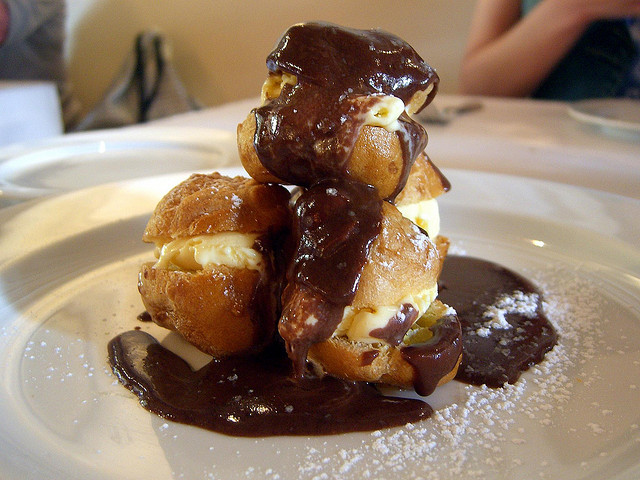This week saw the final of the Great British Bake Off, a television programme in which 13 people spend a weekend in a tent, baking cakes and bread.  Over 6 million viewers tuned in each week to catch the adventures of the amateur bakers, as they crafted three-dimensional novelty vegetable cakes, tricky millefeuille and choux pastry delights, while avoiding that ultimate sin against pastry - a soggy bottom. It has also inspired a new generation of home bakers. Here's your quick fire science on baking, with Matt Burnett and Simon Bishop.
Over 6 million viewers tuned in each week to catch the adventures of the amateur bakers, as they crafted three-dimensional novelty vegetable cakes, tricky millefeuille and choux pastry delights, while avoiding that ultimate sin against pastry - a soggy bottom. It has also inspired a new generation of home bakers. Here's your quick fire science on baking, with Matt Burnett and Simon Bishop.
- Conventional baking relies on gluten. Gluten strands form when flour is mixed with water, forming stretchy gluten networks. The more you knead bread and pastry dough, the tougher those networks become.- To make flaky textured cakes and pastry, you need to use butter. This is full of fats that coat flour, preventing it from forming gluten strands. Sugar and milk also prevent gluten formation.- Salt contains charged particles that interact with gluten, lining it up to make doughs stronger and more elastic.- Yeast is a living organism that feeds on sugar, releasing alcohol and carbon dioxide, which raises the loaf. The alcohol evaporates during baking, and the by-products of yeast add flavour. - There are other ways to make bakes rise. Choux pastry is full of moisture which turns to steam when cooked. - Choux pastry is particularly tasty when stuffed with crème pâtissière, and lavishly coated in chocolate.- Egg white is a mixture of water and proteins, which are reshaped and stick together when whipped. Whipping adds air to the mixture, which is trapped during baking.- But beware, this won't work in plastic bowls, because no matter how hard you wash them, there will always be a bit of fat sticking around to spoil your fun. - Copper pans really do make the best meringues. Copper ions from the pan mix with egg protein, making your peaks the stiffest they can be.- Increasingly, more and more people are being diagnosed with food intolerances that make conventional baking tricky. 1 in 100 people in the UK are coeliac and are unable to eat gluten, as it triggers their bodies to attack the gut, making it difficult to absorb nutrients from food.- Gluten-free baking requires alternative flour blends. Xanthan gum is used in the place of gluten to stick doughs together. Xanthan gum is a by-product of fermenting bacteria, a bit like alcohol from yeast.- The world's longest cake was baked in Turkey in 2006 - it was nearly 3 kilometres long.










Comments
Add a comment